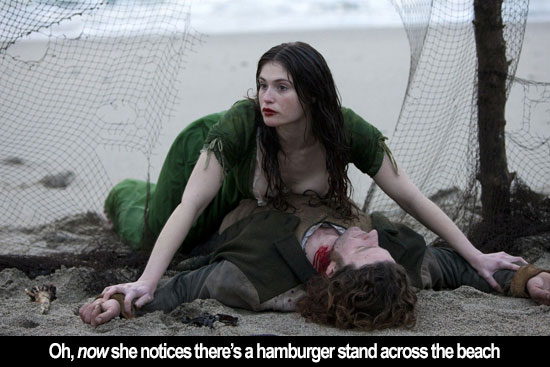
****/****
starring Gemma Arterton, Saoirse Ronan, Sam Riley, Caleb Landry Jones
screenplay by Moira Buffini, based on her play
directed by Neil Jordan
by Walter Chaw What is it about the Irish character, that particular quality of melancholy fatalism, that seems to inform the great works of native sons Beckett, Joyce, and maybe Yeats in particular? I like G.K. Chesterton’s description of Ireland as a place of “men that God made mad,/For all their wars are merry,/And all their songs are sad.” It infects the folklore, the story of the crags and the heather, the looming, low skies pregnant with what Michael Almereyda’s criminally underestimated (and long forgotten) The Eternal fashioned into a creation story involving unimaginable losses and the sweet, bitter tears they inspire. To that film, add John Sayles’s The Secret of Roan Inish, Neal Jordan’s Ondine, and now Jordan’s rapturous Byzantium: a quartet of supernaturally-tinged pictures that together form a lush polyptych that captures the very sensation of walking through Dublin in the rain, or along the shores of Galway, or through the pages of Ulysses in the company of Leo and Nora. As for Byzantium, it’s beautiful, and sad, and has an eternity to it that’s reflected in its tale of a “soucriant,” a succubus of sorts with a Dominican history and favoured by Jean Rhys in novels that were themselves attempts to come to terms with the tragedies of her life as an outsider. Jordan, well-read and never shy about expressing that literariness in his pictures, is producing in his later work the very evocation of a city from Italo Calvino’s Invisible Cities (a book he once told me he admires): Ersilia, an abandoned city built not of walls, but of strings the lost inhabitants used to mark connections with one another. Jordan weaves an intricate web with Byzantium, a film that, before even attacking the tensions within, provides tensions without in its title, most likely taken from Yeats’s “Sailing to Byzantium,” which is itself about tensions between the “artifice of eternity” and the temporariness of youth. Turns out, the film is about that, too.

 by Walter Chaw
by Walter Chaw
 by Walter Chaw
by Walter Chaw